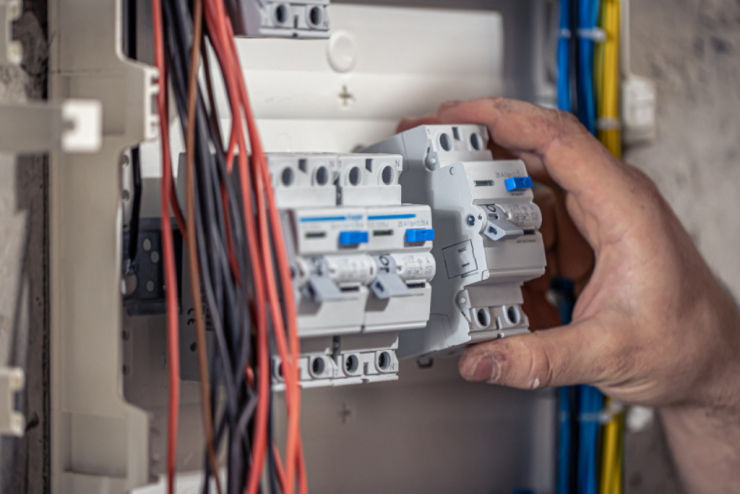How a Subcontractor Network in Poplarville, MS Can Boost Your Business Connections
The Value of Subcontractor Networks in Local Markets Subcontractors in Poplarville face specific challenges in finding consistent work and building...

Did you know that electrical malfunctions are one of the leading causes of house fires in the United States? According to the National Fire Protection Association (NFPA), outdated electrical systems—particularly faulty wiring and overloaded panels—account for thousands of home fires annually.
Unfortunately, many homeowners don’t realize the danger until it’s too late. That’s why recognizing the early warning signs of electrical issues is critical. Whether you're living in a historic home in Massachusetts or a modern build elsewhere, outdated or unsafe wiring can put your family and your property at serious risk.
Here are 7 common signs that your home’s electrical system may be dangerously outdated—and what you should do about it.
Occasional tripped breakers are normal—especially when you’re running several high-wattage appliances on the same circuit. But if your circuit breaker trips repeatedly, that’s a clear indication that your system is overloaded or your wiring has a problem.
Older homes often have electrical panels rated at 100 amps or less. But modern households—with air fryers, EV chargers, hot tubs, and home offices—require much more power. If your home has an outdated panel, consider upgrading to a 200-amp service panel to safely handle your electrical load.
🔌 Pro Tip: If your breakers trip when turning on something like a microwave or vacuum cleaner, it’s time to call a licensed electrician for an inspection.
Wiring that is frayed, cracked, or chewed (yes, rodents do that) is a serious fire hazard. You might discover this damage during a renovation project, when opening a wall, or even by accident when cleaning.
Damaged wires can result in electrical arcs, which may ignite nearby insulation or drywall. Even if the wiring looks okay on the outside, old insulation could be brittle and dangerous.
⚠️ Don’t DIY this one. Damaged wiring should always be handled by a professional.
Have you noticed lights flickering when your air conditioner kicks on or when someone uses the microwave? While a flicker here and there during a storm is normal, regular dimming or flickering lights are often a sign of an underlying wiring issue.
This could mean your electrical system isn’t distributing power properly—or that the wiring is degrading and unable to keep up with today’s energy demands.
💡 Note: Flickering lights may also indicate loose wiring, a faulty circuit, or poor grounding—all potential fire hazards.
If you ever see black or brown discoloration around outlets or switches—or notice a faint burning odor—unplug everything immediately and shut off power to that circuit.
These marks are telltale signs of overheating wires. In many cases, heat builds up due to loose or damaged connections inside the wall. Eventually, this heat can lead to an electrical fire.
🚨 Urgent Action Required: Contact an electrician right away if you notice any signs of heat or burning.
Electrical outlets and switches should never feel warm or vibrate. If you detect either, it could mean the outlet is overloaded or has faulty wiring behind it.
Worse yet, if the wiring is deteriorating or loose, the outlet could short circuit or spark—posing serious fire and shock risks. In some cases, the warmth comes from old aluminum wiring or incorrect wiring connections behind the faceplate.
🧯 Don’t wait: Stop using any outlet that feels warm and have it checked professionally.
Electricity should be silent. If you’re hearing strange noises—like buzzing, sizzling, or popping—coming from outlets, switches, or light fixtures, you may be dealing with loose wiring or a damaged circuit.
This is often caused by worn-out components or faulty installations. In some cases, the wire insulation may be melting, creating intermittent contact between conductors. That sound you hear? That’s electricity arcing—and it’s as dangerous as it sounds.
👂 Use your ears as well as your eyes when inspecting your home for signs of electrical issues.
If your home was built between the late 1960s and early 1970s, it may contain aluminum wiring—a once-common alternative to copper that’s now known for its risks.
Aluminum wiring is much more likely to loosen over time, oxidize, and overheat, especially where connections are made to outlets or switches. Studies have shown that homes with aluminum wiring are up to 50 times more likely to suffer electrical fires.
If you suspect your home has aluminum wiring, consult a qualified electrician about upgrading to copper wiring or using aluminum-to-copper connectors.
Beyond these 7 key warning signs, be alert for additional red flags:
Sparking when plugging or unplugging appliances
Unusual electrical shocks from switches or cords
GFCI outlets that won’t reset or don’t trip during testing
Outlets that don’t hold plugs securely
Missing or broken faceplates on outlets or switches
If your home is more than 30 years old, or if you’ve noticed any of the signs listed above, now is the time to schedule a comprehensive electrical inspection.
At SubCity Contractor Network, we connect Massachusetts homeowners with licensed, insured, and vetted electricians who specialize in electrical diagnostics, panel upgrades, rewiring, and code compliance.
A full safety inspection includes:
Electrical panel and circuit breaker testing
Outlet and switch function checks
Wiring integrity assessments
GFCI and AFCI compliance review
Thermal imaging for hidden overheating
Outdated wiring isn't just an inconvenience—it's a serious threat to your home's safety. Don’t wait for a small sign to become a catastrophic event.
📞 Call us today at (228) 224-2703 to schedule a trusted electrician near you
📍 Serving Massachusetts and surrounding regions
🔧 SubCity Contractor Network Pro, LLC – Connecting homeowners with top-rated, reliable home service pros
Protect your family. Upgrade your wiring. Stay safe.
Did you know that electrical malfunctions are one of the leading causes of house fires in the United States? According to the National Fire Protection Association (NFPA), outdated electrical systems—particularly faulty wiring and overloaded panels—account for thousands of home fires annually.